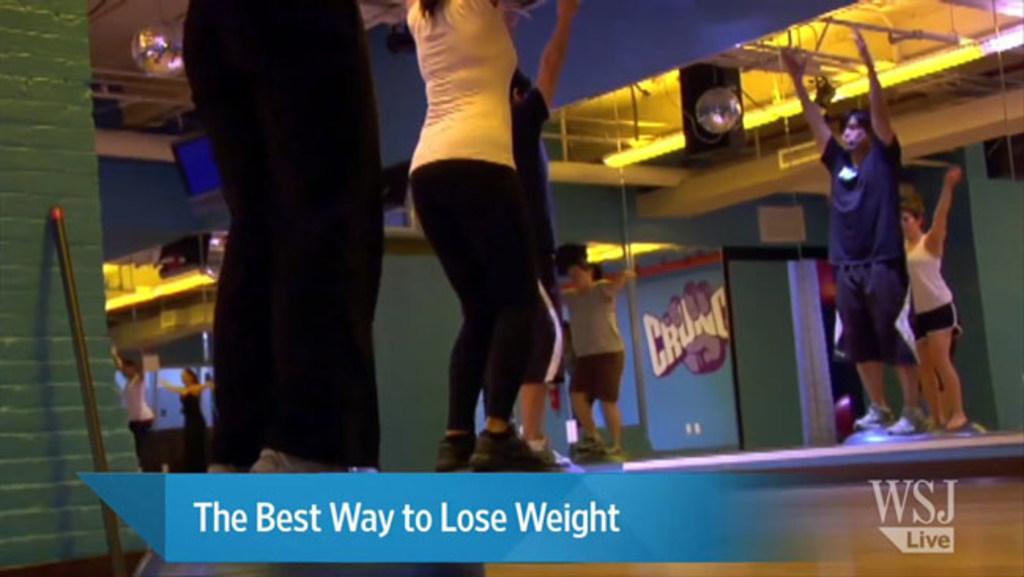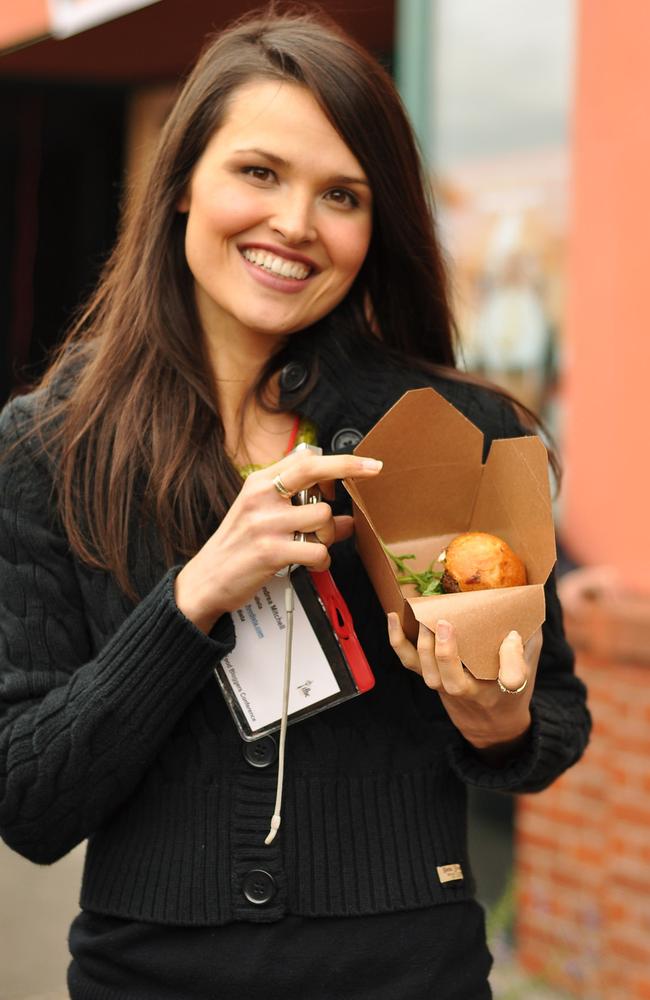Andie Mitchell’s remarkable weight loss story
ANDIE Mitchell weighed almost 140 kg by the time she was 21. But when she lost 60kg, she found that skinny was its own kind of prison.

ANDIE Mitchell spent the morning of her 20th birthday baking her favourite dessert, sour cream fudge cake. Spreading the espresso icing over the chocolate sheet cake, a feeling of overwhelming longing hit.
The cake called to her.
“A new hunger appeared, unexpected and urgent, the kind that forced me to stop whatever I was doing and tend to it,” she writes. “It was the kind I couldn’t ignore, the one that wrestled away my power, every hidden weapon of will, and thrust me into the kitchen.”
She carved one test slice and ate it with fervour.
“It felt like teetering on the ledge on the roof of a skyscraper, exhilarating and terrifying. The split second decision between balance and oblivion.”
Oblivion won out. With almost sensual levels of desire, Mitchell unconsciously reached for the knife to cut another slice. And then another, and another, until she snapped out of her sugary trance and looked at the cake stand: Only a single slice remained. She had eaten nearly all of her birthday cake.
This is the scene that opens Mitchell’s heart-wrenching weight-loss memoir It Was Me All Along, out Tuesday.
The birthday-cake fiasco was a low point — but not even close to rock bottom for the young woman who had never before experienced life as a healthily-sized person. At 90 kilograms in eighth grade — ballooning to nearly 136 kilograms by her 21st birthday — she was morbidly obese and heading toward a dark future.
But being the “fat girl” was her identity; it was all she knew. So when she dropped an incredible 61 kilograms, she found that being thin doesn’t necessarily equate to being happy.
Thinness, she would find, was its own kind of prison.

IS THAT WHAT I’VE BECOME?
Mitchell didn’t have a chance growing up — both nature and nurture were working against her. She inherited her father’s 159 kilogram frame and his bad habits. He would start drinking in the afternoon and drink through the evening, bingeing on more food the drunker he became. She followed his lead, calling him her “food role model.”
Her mother, one of eight from a poor family, expressed love by plying her family with double and triple portions of food. For Mitchell’s 5th birthday, she cooked every one of her favourite foods — from spaghetti and meatballs to chicken pâté to cakes to cupcakes to pies.
Food was love personified. “She would stay home with me when no one else would, when no one else could; she let me make decisions all by myself; she promised I was in control when we were together,” Mitchell writes.
The year Mitchell’s father died of a stroke at age 40, 12-year-old Mitchell gained 12 kilograms. Her doctor issued a stern warning: “At this rate, I predict you’ll weigh 300 pounds (136kg) by the time you turn 25,” he said.
She tried dieting and even enlisted in two weight-loss studies, with limited to counterproductive results. She had just become a teenager and had already outgrown most of the sizes sold in her mall’s stores. For her first high school dance, she had to hire a tailor to custom-make her eggplant-coloured dress.
At college, her weight skyrocketed. She ate with mindless abandon. She recalls one late night stop at McDonald’s where she ordered a large fries. Only after she had finished them, she turned to her friend and said, “I don’t even like McDonald’s french fries.”
When she returned home for the first time from school, she was a size 22, up two dress sizes from high school. She visited the local YMCA and stood on the scale for the first time.
“I was 268 pounds (121kg). This was a really scary moment for me. Terrifying. I just saw that my dad was 350, I knew that there were future versions of me that were bigger and bigger. I was 20 years old. I didn’t want to turn 21 having never felt good about myself,” Mitchell tells The Post.
“I compared myself to the spectacle of people I’d seen on television shows. The half-ton man; the woman who never left her house again; the panel of obese teens on talk shows; the mother who was forklifted from her home ... Is this what I’ve become? Or at the very least, am I on my way?” she writes.

LOSING THE WEIGHT
It would be torture, but Mitchell vowed to hit the elliptical. She kept a food journal and diligently logged her caloric intake. She set a goal weight — of 140 pounds (63.5 kilograms) — and recited a mantra she read in O magazine: “Can you do it today? Can you make it through today without bingeing?”
Eating healthily during the day wasn’t the problem — breakfasts of egg white and wholegrain bread and lunches made up of salads were easy — it was after sundown that tested her willpower.
“I felt that deep longing for sweets. Come 8 or 9pm, my stomach felt hollow. I wanted cake. I wanted chocolate. I couldn’t watch television without looking at my lap, where I wished there could be a bowl of crunchy something,” she writes.
Her sugar addiction was so acute that she would wake up with “sweaty palms, my body writhing in discomfort.”
She recalls nights of insomnia because her “mind was running the aisles of a supermarket, grabbing Oreos and Lucky Charms in a fever.”
To distract herself, she called friends, wrote in her diary, and took long walks in nature, which she says made her feel that she was more than just her food cravings.
By the end of that summer, she had lost 13.6 kilograms and continued to lose weight at school. And then it was off to Italy for a semester abroad — which, for most people, would have been a diet death sentence. But Mitchell discovered the European way of life. She began to walk everywhere. She ate only three meals a day and never snacked.
“Everyone talked about food in the most loving ways. They discussed where it came from, the ingredients. The portions were smaller, even the plates were smaller,” she says. “I was more aware of what I was eating and therefore appreciated it more. I felt a fullness that was entirely new.”
When she returned from her trip abroad she had lost 25 kilograms. Two months after returning from Italy, she lost another 10 kilograms, besting her goal weight by clocking in at 60 kilograms.

PAIN OF BEING THIN
She felt “attractive and desirable and valuable in a way that I wasn’t before. And that made me sad.”
The downsides, less obvious than the benefits at first, hit her harder.
She became obsessive, counting every morsel that passed her lips and making sure that she ate nothing more than 1,600 calories a day. Going out to parties only waylaid her efforts (how could she afford the caloric amount to have a drink?) so she avoided them altogether.
When in public, she felt under watch. If she ate a salad, someone would inevitably remark with pity how hard it is to stay thin; if she opted for a slice of pizza, someone would warn her not to eat too much.
“This was a very hard time for me. Food is fun. Food makes up some of my best memories, and now I was changing my relationship to food and it changed my relationship with everyone else. It led to depression. I was like, ‘This is me. I’ve changed.’ And it really hurt my family.”
Fear fuelled her weight loss. She retreated into a private world of calorie counting and self-flagellation, another side of the same “obsessive coin” as her overeating.
“Everyone was like, ‘You’ve changed.’ It seemed like I was being very narcissistic and selfish. And I’m a people-pleasing person, so this is the worst thing you can say about me,” she says.
She began to fight with her then-boyfriend Daniel, who also suffered from overeating.
She pictured the rest of her life in this diet prison and began to see “the sadness, the isolation, the dullness of colour palette” of her new life. She calls it “the heaviness of being.”
Even Mitchell’s new body had to adapt. She had surgery to remove rolls of excess skin from her stomach.
“It has taken me a long time to accept that it will always be marked and scarred. They are the scars of my past, and I will always have a little insecurity,” she says.
Mitchell had never been a depressive person before — the food was a numbing agent against those feelings. Now, despite losing the weight, she was sadder than she had ever been before.
Eventually she sought out therapy and professional guidance. She began to talk about her association between food and love and was diagnosed with an eating disorder.
She also began to take her food-journaling public by writing a deeply personal blog called Can You Stay For Dinner? There she tackled the struggles of keeping the weight off and her failures. A devoted audience shared their stories and cheered her on. The whole process became a catharsis.

Now she does not restrict any food group — but practices “everything in moderation.” She works out three to four times a week and walks constantly around her Hell’s Kitchen (NYC) home. She sticks to healthy, homemade foods most nights but allows herself to go out to eat at least once a week. She says that she would “never live a week without a dessert.”
With these concessions, she’s gained seven kilograms and is a more manageable weight of 68 kilograms.
“It’s taken me 10 years to find a weight where I feel like, ‘I’m good here.’ It’s the weight where you don’t have to struggle. It’s when you don’t have to turn down an Oreo,” she says.
Food is still her life’s central focus — perhaps even obsession. In addition to her food-centred blog, she also recently finished the manuscript for a cookbook that will be published next year.
Though she no longer experiences food-anxiety, she does admit that she does have a fleeting sense of hunger in the face of emotional discomfort, but she knows the source now and is able to control it.
That little inner chubby girl, the middle schooler who ate her feelings, is still there, she concedes. “And probably always will be.”
This story originally appeared on the New York Post.




